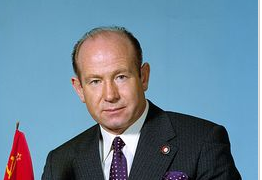Whether it was odd alleyways in a town, or random birds and mushrooms on a hunting trip, he was always lagging behind, appreciating them. One of his pilot-training photos showed him, in full uniform, lying in a clover field to gaze tenderly at a stem of flowering grass. Now he had seen the colours of space. He had prepared for it, he thought, taking a sketch pad and crayons onto Voskhod-2.
不管是镇子里的小巷,还是狩猎旅行中看到的随机的鸟儿和蘑菇,列昂诺夫总是会走在大家后面,欣赏它们。 在一张飞行员训练的照片中,列昂诺夫身穿制服,躺在长着三叶草的田野中,温柔着凝视着一束花草。现在列昂诺夫看到了太空的颜色。他为此做了准备,他把一个速写板和蜡笔带到上升2号飞船。
Yet nothing could have prepared him. There were so many more colours than on Earth, and so much brighter. Onboard he sketched the sunrise, with its astonishing sharp luminescence of red, green and yellow against the black and the blue. When Yuri Gagarin, the first man in space and his best friend from cosmonaut training, the short handsome foil to his tall, fair, bland-faced self, came on the radio during the walk to ask how "Artist" was, he simply said: "I can see so very much."
然而,他却毫无准备。那里有比地球上多得多的颜色,也比地球上明亮得多。他在船上画了日出的素描,在黑与蓝的衬托下,日出的红、绿、黄三种颜色发出令人惊异的强烈的光。尤里·加加林是首位进入太空的人类,他是宇航员训练中列昂诺夫最好的朋友。与高大、白皙、面无表情的列昂诺夫相比,他显得矮小而英俊。 加加林在电台上问正在天空行走的列昂诺夫什么是艺术家,他简单地回答道:“我能看到如此多的东西。”

Undoubtedly he had to mention that blue if, as he hoped, he spoke to Earth as the first man standing on the Moon. He trained hard for that, mostly by using helicopters as mock lunar-landing craft, but the Soviet plans struck him as downright dangerous. In any case, in the space race that consumed the world's two great powers for almost two decades, the Americans nosed past in 1969 with the Apollo 11 landing. He watched it, one of the few Russians allowed to, his heart pounding with anxiety for the crew.
毫无疑问的是,正如他希望的那样,如果他作为首位登月的人和地球对话,他得提到这个蓝色的星球。为此,他进行了艰苦的训练,主要是使用直升机作为模拟月球登陆太空船,但苏联的计划让他觉得非常危险。不管怎样,在这场消耗两大强国近20年的时间的太空竞赛中,1969年,随着阿波罗11号的着陆,美国人匆匆走过月球。作为被允许观看的为数不多的几个俄国人之一,他注视着这艘船,他的心因对船员的担心而怦怦直跳。
译文由可可原创,仅供学习交流使用,未经许可请勿转载。













